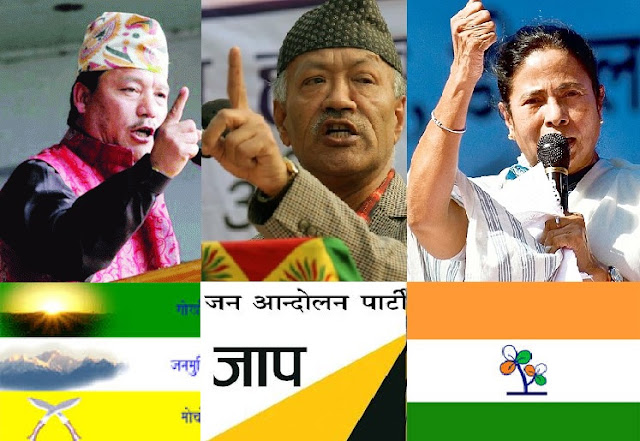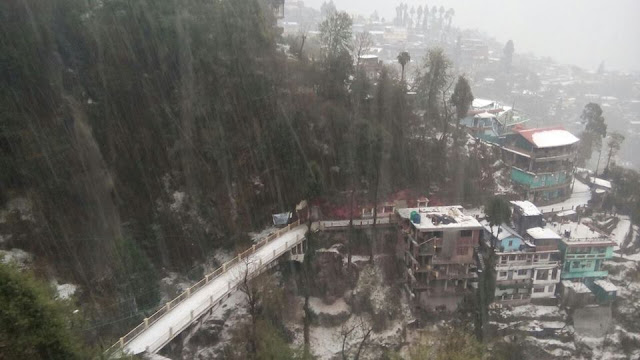Darjeeling Hills is boiling with the fear of virus every passing day, disorder and chaos seems to be the order of the day. Yet Corona isn't the virus that would eventually take us to our grave it would be unhealthy politics of our local leaders.
With 2021 Bengal Election nearing, the political parties in the Hills have found a new crutch to straighten their political leg, the Coronavirus .
 |
| COVID 19 No Facilities as Woman Breastfeeds in Bengal Tea Garde.Screengrab from a video taken by The Quint, was taken at a tea garden in Darjeeling run by the Bansal Tea Corporation. |
At a time where the notion should have been 'Unity is Strength ,' the political parties are busy drawing political blood. The leaders have become performers of a cheap roadside show, whether it is becoming a porter carrying loads in jeans and t-shirts, or the superhuman saviour of a district without doing anything much, or walking through the alleys of hospitals wearing a Modi coat. The cast is simple yet it confuses the Hill flock. With the increasing number of COVID-19 + patients in the Hills , the political parties are leaving no stone unturn to garner public sympathy. They should understand that the present problem of dealing with the virus should be their priority else there won't be any public left in hills for their politics and their parties.
Now,more than ever,the people greatly feel the absence of locally elected political body and leaders who would have governed the people and would have been accountable to them. Whereas now our people are running from pillar to post in desperation, whether it be finding out how to get back home or asking for quarantine centers and sometimes even fighting with the administration in keeping and following the lockdown rules( a blatant violation was seen in Kalimpong when a lady had returned from Kolkata while Kpg was still a containment zone and had refused to be admitted to the quarantine center, only after huge protest and uproar by the locals, had the administration and the lady relented). With the numbers rising, their demand of Testing labs in the Hills has still not been met with. The lackadaisical treatment which has always been metted to the people from the hills and North Bengal with hundreds of result of the test still unknown, the fear of an unknown fate seems prevailing within the hills.
The nationwide introduction of Ayushman Bharat in which a BPL family would be benefitted with 5 lacks medical insurance has not been allowed to function by the TMC Bengal govt. The people are deprived of basic healthcare facilities,whose fault is that? Thousands of poor families would have been benefitted by the insurance but the politiking of the Bengal govt has made sure we are deprived of even the most basic facility. None of the local leaders address this issues least the hammer of displeasure of their Master's criticism fall on their puny political ambition.It is not important to them .
Another scheme is Kishan Saman Nidhi which benefits 8crore farmers in the country . This welfare schemes should have aided the farmers of our Hills in this time of crises but since there is no cut to the syndicate the scheme is not implemented. So when these farmers are deprived of their livelihood, will they take the blame?
The condition of the tea garden workers is well known to everyone, their garden opened even when the lockdwown was in strict accordance, their wages have yet to see any increase, many a times tea garden owners have left without issuing salaries and bonuses and have abandoned the garden. The leaders would not have a say, the agreements in Nabana is also not hidden from us.
Now isn't the time for these political parties to dig deep into their differences rather they should have come together for their people, showing solidarity .However, it seems that they have sniffed an opportunity to suck what is left of the Hills people's blood like parasites, trying to project the guise of working for the people when is reality very little has been actually done. All this so that it can encash the Bidhan Sabha election in 2021.
These political party have over the years stripped every bit of life and self respect from the community, the people, wages of the tea garden labourers of the world renowned Darjeeling Tea still miniscule and bonuses not paid,their sons in the exile, hundreds of them imprisoned for demanding their constitutional right, many being shot down, many tortured to death in jails, unemployment , no Central University, lack of good government hospitals the list could go on forever. Thousands of our youngesters have migrated to cities and abroad not because they want to but because they have to due to lack of any employment. The money they sent back home is what has kept the hearth of many villages burning,it is what saved the people from the food and essential blockade done by Bengal govt during the Gorkhaland andolan of 2018.And yet during this crisis all the local leaders can do is prune themselves, busy soaking their political projection of having done something and nodding their heads and justifying all the mistakes of their masters at Nabanna. They had just one agenda to fight for their people and for Gorkhaland. But that it seems has taken a backseat. Gorkhaland and the people don't matter to them, they don't want to rise from their luxurious slumber provided by their masters sucking the lives and blood of the hill people .The Hall of Illusions created by Maya has seeped into their beings lulling them into believing whatever is being projected. Through blindness to reality our political leaders has unleashed destruction and anguish upon our people.
All they are ready to do is make silver potholes for us to fall in the trap.
On the contrary the press conferences have become regular, FB pages are advertising the the work of their leaders , but none of them are addressing the real issue which should have been dealt by now, i.e, to Establish Testing Lab in the Hills, set up more quarantinne centers, community awareness so that none faces discrimination in their villages.
These issues should have been dealt when the lockdown was announced .All parties should have come together to ask for Testing Labs, restrict movement during lockdwown. While some became busy in providing relief work, others started watching them with eagles eyes so that in the slightest error they would inturn condemn them, and perpare their ground.So even after 2 and half months of shut down we are exactly where we were, deprived of basic amenities to fight the virus.
When the team from Centre visited Kalimpong as then it was a hotspot did any leader think it necessary to ask for a testing lab? Did they even go and meet the team? Wasn't it necessary? Now they fight over claiming things to be done. Pathetic is not enough to describe the so called leaders.
If an honest survey was done about the leaders of the Hills, I am sure they will have nothing good to share of as every person in the Hills know that they have not only conned us out of resources and life but they have stripped us of our dignity. They have to rise from their comfort zones, provide public service beyond imagination or else their chances of existing in the Hills as a representatives of the Hill population seemed hazy and blurred. Their lack of vision would ensure their fall.
With true net testing being started in Kalimpong and Darjeeling from yesterday there is still a long way for the battle against the Coronavirus. I am looking forward for their anticipation, are you ???
Via the Gorkhali

























